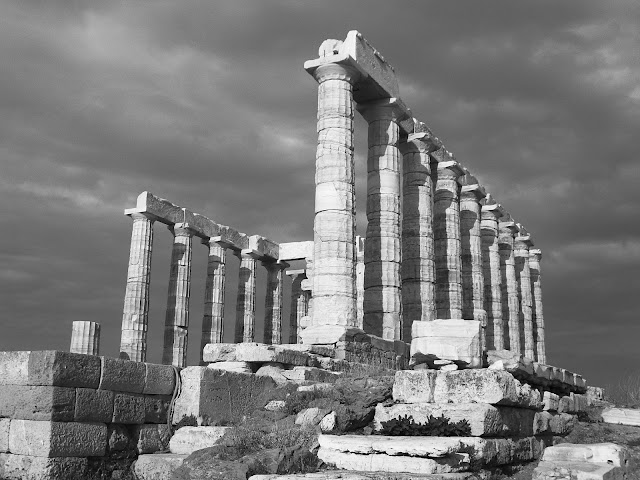HIST & MYTH: Poseidon's Temple – Sounion
Written by Ben Kesp
There are certain moments in life which will linger in your memory. One of those moments for me was sitting at Poseidon’s Temple at Sounion, Greece to watch the sun retreat below the horizon of the Aegean Sea on a beautiful warm July evening.
The ruin of the temple we see today was built during the 5th century B.C and was dedicated to Poseidon, Greek god of the sea and brother to Zeus and Hades. The current ruin stands over an earlier temple whose foundations you can still see. The site itself can be traced to the Bronze Age. Only thirteen of the Doric Style marble pillars of the temple survive today. Four of the north columns were reconstructed in the 1950s.
The location of the temple is on an amazing site of Cape Sounion overlooking the sea on three sides. What is more amazing and popular with visitors is to be there for the setting of the sun over the Aegean Sea. In Greek Mythology, the Aegean Sea was given its name after Aegeus, King of Athens. King Aegeus had waited anxiously, searching for the return of his son’s ship from Crete, only to spy a black sail appear on the horizon, signalling to him that his son had been killed in a contest against the Minotaur, a monster of half man and half bull. On sighting the black sail, the king leapt to his death from Cape Sounion.
 |
| Sun Setting over the Aegean Sea |
The current temple ruin on Cape Sounion was built under the instruction of the Athenian statesman Pericles. The Athenians fortified the site as best they could to keep it from Spartan’s hands however it eventually fell from the Athenian’s grasp.
A site one must visit if you are in Greece and what better way to close than with a few lines from the poet Lord Byron, who on his first visit to Greece, it is said had the poem carved into the base of one of the Temple’s columns. An image of the temple and the full poem from Lord Byron, you can get from a table matt at the nearby restaurant that looks towards the Temple of Poseidon.
Place me Sunium’s marbled steep,
Where nothing, save the waves and I,
May hear our mutual murmurs sweep...



Comments
Post a Comment